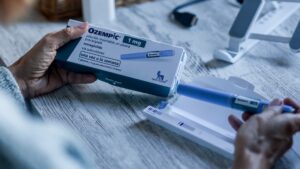Weight loss drugs are becoming increasingly popular in the United States, despite their high cost and limited insurance coverage. A recent survey conducted by Evercore ISI found that patients’ willingness to pay out of pocket for these treatments is strongly correlated with their annual income.
The survey focused on GLP-1s, a new class of medications used to treat Type 2 diabetes and obesity. Participants were asked about their current or past use of GLP-1s and their willingness to pay for these drugs. The results highlighted concerns about the equity of access to these breakthrough treatments, especially in the face of sparse insurance coverage.
GLP-1s, which include popular drugs like Wegovy and Ozempic, can cost between $900 and $1,350 per month before insurance and discounts. While both Novo Nordisk and Eli Lilly offer savings programs to reduce out-of-pocket costs, the survey revealed significant disparities in how much patients are willing to pay based on their income.
Individuals with higher annual incomes were more willing to pay higher amounts out of pocket for GLP-1s, with nearly 60% of those earning over $250,000 indicating a willingness to pay more than $300 per month. In contrast, only about 4% of individuals earning less than $75,000 said they were willing to pay that much, with the majority stating a maximum price of $50 per month or less.
Furthermore, the survey also explored how long patients stayed on these medications and their reasons for discontinuing treatment. While cost was a significant factor for some, others stopped taking the drugs after achieving their weight loss goals or experiencing side effects. Despite these challenges, nearly half of current GLP-1 users expressed a desire to stay on the medication permanently.
The survey also examined the impact of GLP-1s on patients’ eating and drinking habits, noting that a majority reported eating less while on these medications. Additionally, there were changes in alcohol consumption patterns among participants, with some reporting a decrease in alcohol intake while taking GLP-1s.
These findings shed light on the complexities surrounding the use of weight loss drugs and highlight the need for improved access and affordability. As research in this field continues to evolve, it will be crucial to address the disparities in access and outcomes for patients seeking these innovative treatments.
Source link


